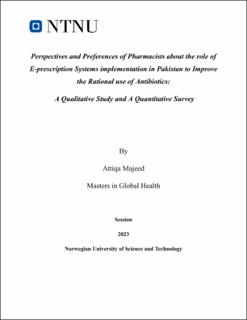| dc.description.abstract | Abstract
Background: The implementation of E-prescription systems holds the potential to revolutionize
healthcare practices, particularly in the context of antibiotic dispensing. This study aims to
investigate the perspectives, preferences, and challenges faced by pharmacists in Pakistan
regarding the integration of E-prescription systems to enhance the rational use of antibiotics. A
mixed-methods approach, combining qualitative interviews and quantitative surveys, was
adopted to achieve a comprehensive understanding of pharmacists' attitudes toward
E-prescription systems.
Objectives: The study aimed to explore pharmacists' perspectives on E-prescription system
implementation, assess their preferences concerning E-prescription systems for antibiotic
dispensing, and identify challenges encountered during the integration of such systems in
Pakistan.
Methods: This mixed-methods study combined in-depth interviews with 30 pharmacists and a
quantitative survey of 200 pharmacists in Pakistan's community pharmacies. Purposive sampling
ensured diverse perspectives. Thematic analysis was applied to interview data using "diktafon"
software for audio recording and transcription. The online survey via Google Forms gathered
preferences, attitudes, and challenges. Ethical guidelines were followed, ensuring confidentiality
and anonymity. For qualitative data thematic analysis was used to analyze interview data,
identifying patterns, themes, and categories. NVivo's coding features were used to group data
into potential themes, which were then refined and validated. This systematic examination
helped identify recurring themes and extract meaningful insights. However, for quantitative
study the data was analyzed using descriptive statistics in SPSS to summarize and characterize
responses to closed-ended questions, providing insights into prevailing trends.
Results: The qualitative study showed the thematic analysis reflect pharmacists' recognition of
the potential of E-prescription systems to address challenges related to handwritten prescriptions,
enhance antibiotic stewardship, and improve patient care. The study suggests that addressing
antibiotic resistance requires multifaceted efforts, including technological advancements,
educational campaigns, and policy interventions. While, quantitative findings revealed that 12
maximum respondents (n=189 93.1%) belonged to age group of 25-34 years. Majority of
respondents (n=137, 67.5%) were male. Most of the participants (n=88, 43.3%) belonged to
Punjab. Most of the participants (n=118, 58.1%) were community pharmacists. Majority of
respondents (n=166, 81.8%) had experience of 1-5 years. Out of the total respondents, (n=27,
13.3%) have experienced E-prescriptions, while the majority, accounting for (n=176, 86.7%)
received manual prescriptions. Regarding the legibility of handwritten prescriptions, 61.6% of
respondents received prescriptions that were clear enough to read, and (n=65, 32.0%)
encountered illegible prescriptions that were not clear enough to be read. Respondents from
Balochistan, as well as other regions, demonstrated positive attitudes towards E-prescription
systems for antibiotic dispensing.
Conclusion: This study provides valuable insights into pharmacists' perspectives, preferences,
and challenges related to E-prescription systems for antibiotic dispensing in Pakistan. The results
highlight the potential benefits of E-prescriptions in promoting rational antibiotic use and
combating antibiotic resistance. The study's findings could inform policymakers and healthcare
professionals in devising strategies to enhance E-prescription system implementation and
contribute to the improvement of healthcare practices in the country. | |
